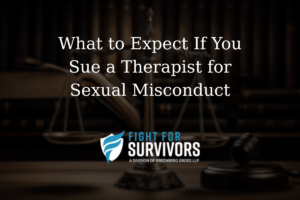
Suing a therapist for sexual misconduct is a difficult and deeply personal decision. When someone entrusted with your emotional well-being uses that position to harm you, the betrayal can leave lasting damage. For survivors, pursuing legal action is not just about holding the therapist accountable—it’s also about protecting others and reclaiming control.
If your therapist engaged in sexual contact, initiated a sexual relationship, or blurred the boundaries of the therapeutic relationship in any inappropriate way, you may have grounds for a lawsuit. This article outlines what to expect from the legal process and how survivors can seek justice, support, and healing after experiencing abuse in therapy.

What Counts as Therapist Sexual Misconduct?
Contact Us For A Free Legal Consultation. No Fee.
Call (833) 55-FIGHTSexual misconduct in therapy can take many forms. It includes any sexual contact or behavior between a therapist and a client, whether during therapy sessions or outside of them. This might include touching, flirting, sexual text messages, or more overt actions such as sexual exploitation or coercion.
Because of the inherent power imbalance in therapy, any sexual involvement between a therapist and their client is considered unethical and, in most states, illegal. Therapists are expected to follow strict professional boundaries and ethical standards designed to protect clients from harm.
Even after therapy ends, if the therapist initiates or continues an inappropriate relationship, they may still be held accountable under both civil and professional misconduct laws.
Common Warning Signs of Inappropriate Behavior
Survivors may not always recognize misconduct right away, especially if the therapist masked it as emotional support or caring. However, the following warning signs may indicate that your therapist violated ethical or legal standards:
- Unwanted or confusing physical contact
- Flirting or overly personal conversations
- Repeated offers to meet outside of sessions or for non-therapeutic reasons
- Requests to keep aspects of the relationship secret
- Attempts to control, manipulate, or cross emotional boundaries
- Sexualized comments or discussions unrelated to treatment
If you’re unsure about a therapist’s actions or comments, trust your instincts. Feeling confused, uncomfortable, or fearful during therapy may be a sign that something is wrong.
Steps You Can Take to Seek Justice
When a therapist crosses a line, survivors have multiple legal options. These can include filing a complaint with a licensing board, pursuing a malpractice lawsuit, or seeking disciplinary action through professional licensing boards.
1. Filing a Complaint
Start by filing a formal complaint with the therapist’s licensing board. Every state has a licensing body that oversees mental health professionals. These boards are responsible for investigating complaints, issuing disciplinary actions, and, when warranted, revoking a therapist’s license.
Filing a complaint can also create a public record of the therapist’s actions, which may help prevent future harm to other clients. If the therapist is still practicing, the board has the authority to investigate their conduct and impose penalties.
2. Pursuing a Lawsuit
If you’ve been harmed emotionally, psychologically, or financially due to a therapist’s misconduct, you may have grounds for a malpractice lawsuit. A successful legal claim typically requires proving four elements:
- The therapist owed you a duty of care
- The therapist violated that duty by engaging in inappropriate or illegal behavior
- You suffered harm as a result of that violation
- There is a clear link between the misconduct and your harm
Malpractice cases involving sexual misconduct are serious, and the legal process may involve expert witnesses, therapy records, and testimony. Your attorney will help you gather evidence and assess damages, including monetary damages for emotional pain, trauma, and lost trust in mental health professionals.
3. Filing for Disciplinary Action
In addition to lawsuits and board complaints, some survivors seek disciplinary action by notifying professional ethics committees or national organizations. These committees may also review cases and take action independently from the therapist’s licensing board.
Disciplinary action can result in license suspension, mandatory supervision, or revocation of the therapist’s license entirely.
What the Legal Process May Look Like
Taking legal action may seem overwhelming, especially for someone already coping with trauma. However, knowing what to expect from the process can help reduce anxiety and offer clarity.
- Free consultation: Many law firms offer a free consultation, where you can discuss your case confidentially with an attorney who understands this area of law.
- Gathering evidence: This may include therapy notes, emails, text messages, or documentation of behavior that occurred during or outside of therapy sessions.
- Filing the complaint or lawsuit: Your attorney will help determine whether to file a complaint with a licensing board, start a malpractice case, or both.
- Discovery process: In a civil lawsuit, both sides may request records, conduct depositions, and consult experts to assess the emotional and psychological harm.
- Resolution: Cases may end in a settlement or go to trial. If successful, you may receive compensation for damages and see disciplinary actions imposed on the therapist.
While the legal process is not always quick or easy, many survivors find that simply taking steps to hold a therapist accountable brings a sense of closure and empowerment.
Holding the Therapist Accountable
Many survivors wonder whether a therapist’s actions will ever be made public. The answer depends on several factors. If a licensing board imposes sanctions, the disciplinary record may become available through public databases. However, confidentiality laws may limit what is shared unless you file a civil lawsuit or the therapist loses their license.
It’s important to note that therapists who commit misconduct in one state may try to practice in another. Filing a complaint helps create a paper trail that professional licensing boards across states can reference, especially when therapists try to reapply for licenses.
Holding a therapist accountable helps prevent them from continuing the same behavior with others and ensures that their actions are no longer hidden behind professional titles or degrees.

Emotional Support Throughout the Process
Healing after abuse by a therapist can take time, and pursuing justice is only one part of the journey. It’s important to seek emotional support during this process—whether from a new therapist, support group, or advocate.
Look for a therapist with clear ethical standards, transparency, and respect for professional boundaries. You deserve a safe, trustworthy space for your recovery.
In addition to therapy, friends, family, and legal advocates can also provide strength and stability. Don’t hesitate to lean on a support system as you navigate both healing and legal resolution.
You Deserve Justice and Safety
If a therapist failed you, violated your trust, or crossed professional lines, know that you are not alone. You have the right to file complaints, seek legal action, and make your voice heard. Whether you’re experiencing depression, anxiety, post-traumatic stress disorder, or simply confusion and anger, your feelings are valid—and help is available.
Therapists are trained to do no harm. When that trust is broken, survivors should never feel ashamed of taking action. It is the therapist’s responsibility to uphold professional standards—not yours to suffer in silence.
Frequently Asked Questions
Can I sue a therapist for inappropriate behavior that didn’t involve physical contact?
Yes. A therapist does not need to touch you for their actions to be considered sexual misconduct or unethical. Emotional manipulation, suggestive conversations, or violating boundaries may still be grounds for legal action.
What happens if my therapist loses their license?
If a licensing board finds serious ethical violations, they may suspend or revoke the therapist’s license. This can prevent them from practicing in your state—or in others if reported properly.
Is my therapist’s misconduct a public record?
In many cases, licensing boards publish disciplinary actions publicly. Check your state’s licensing board website or consult your attorney to find out what’s accessible.
Can I file a lawsuit even if I signed a confidentiality agreement during treatment?
Yes. Confidentiality agreements cannot legally prevent you from reporting abuse or seeking legal redress for misconduct.
What if I’m unsure whether what happened was misconduct?
If something your therapist did feels wrong, confusing, or makes you feel unsafe, you should talk to a trusted attorney or advocacy organization. Trust your instincts, and know that you have options.
Experienced Attorneys Who Will Listen And Fight For You
Speak To An Attorney Now »